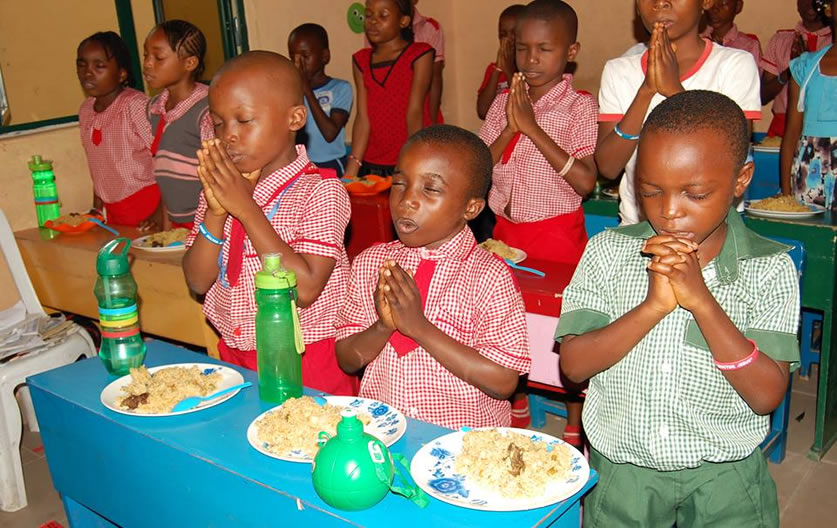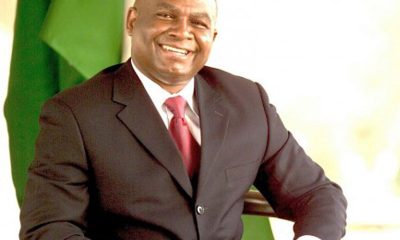Education
Giving 45,000 Nigerian Children Quality Education via OPM Free Schools

By Emmanuel Afonne, (NAN)
For the United Nations Educational, Scientific and Cultural Organisation (UNESCO) and the United Nations International Children’s Emergency Fund (UNICEF), achieving the Sustainable Development Goal (SDG) 4 on education and training modalities by 2030, will be a herculean task in Nigeria.
According to the two UN organisations, one in every five of the world’s out-of-school children is in Nigeria, while about 10.
5 million of the country’s children aged 5-14 years are not in school even though primary education is officially free and compulsory.In the same vein, infographics from Lauretta Onochie, Social Media Adviser to President Muhammadu Buhari, however, said that the number had dropped from 10.
5 million to 8.6 million.Whatever be the case, statistics show that only 61 percent of six to 11-year-olds regularly attend primary school and only 35.6 percent of children aged 36-59 months receive early childhood education which, they said, was the major reason the Millennium Development Goal (MDG) of achieving Universal Primary Education (UPE) by 2015 failed.
To narrow it down, states in the North-East and North-West are the worst hit with female primary net attendance rates of 47.7 percent and 47.3 percent, respectively, meaning that more than half of the girls are not in school.
The cause of education deprivation in northern Nigeria and some parts of the South is, however, not far-fetched.
The Boko Haram attacks and the mayhem unleashed by bandits and killer herdsmen on most of the Nigerian communities have made lots of children drop out of school and thereby putting a snag in government efforts to achieve the SDG 4 by 2030.
Economic barriers and socio-cultural norms and practices are also stumbling blocks to acquiring formal education, especially for girls, and by extension the UN development goals.
Interestingly, the General overseer of Omega Power Ministries (OPM), and the President of OPM Foundation, Apostle Dr Chibuzor Gift Chinyere, have set “Operation Get 45,000 Children Back to School”.
The operation is aimed at ensuring that children of the less privileged from Northern and Southern parts of the country have access to free and complete quality education, within a safe learning environment.
This explains why Apostle Chinyere has built eleven free primary and secondary schools with the state-of-the-art facilities and the pupils and students given four pairs of free school uniform, free school shoes and free school books.
The schools are presently located in Rivers, Bayelsa and Abia.
The students and pupils are also given beverages (Milk and Milo) on regular occasion to compliment the schools free feeding programme.
He said: “Just like the United Nations is advocating, our programme ensures that education is prioritised and that it is targeted at children who are least likely to receive it.
“Our free schools are fully funded through the offerings and tithes received from our members in over 150 branches of the church within and outside the country.
“We want to assist the Federal Government in actualising the SDG by 2030 to make sure all the children have access and quality education, skills and knowledge for lifelong learning,” Apostle Chinyere said.
Seeing the less privileged parents squeeze out their hard earned little money to send their wards to school in spite government’s perceived free education unsettles.
Another free school is presently being constructed in Kaduna to ensure the less privileged in the Northern part of the country are not left out as Nigeria march towards achieving the SDG 4 by 2030.
Apostle Chinyere is taking the gesture to the next level; apart from establishing free primary and secondary schools, the man of God is constructing an all-girls’ free technical college which, he said, would be completed by December this year.
There is no doubt that the federal and state governments have made frantic efforts to ensure that there is free education from primary to junior secondary schools across the nation, but there is still a snag as parents still pay about N2,000 to get their wards go to school every term.
For instance, in some schools parents are forced to pay between N500 and N1,000 for school charge, Parents Teachers Association (PTA) dues and data (usually for computing of results) every term to attend the so called free public schools of government, but it is interesting to note that the cost of attending the OPM free schools is absolutely free.
Apostle Chinyere is saying it to the high heavens that everything in the OPM schools is “absolutely free”.
“We have four sets of school uniforms, school sandals, free school books, free lunch and free school bags. The pupils also go on international excursion; like the last time, they were in Paris.”
This is the reason the National Association of Nigerian Students (NANS), honoured him with the “Icon of Free Education Award”.
Mr Robin Nwokocha, Chairman of NANS, Rivers chapter, who presented the award to Apostle Chinyere on behalf of the national president, said the award came as a result of his commitment to the education of the less privileged children.
Apostle Chibuzor, who appreciated NANS for the award said that apart from the free schools, the church had also given scholarships to five students studying in Canada. He said three others are due to join before the end of the year.
In his words: “We also have a scholarship programme where we send undergraduate students to Canada to study; another three are due to travel soon.
“We also have a local scholarship for undergraduates here in Nigeria because of this, NANS leadership decided to give me an award of Icon of Free Education in Nigeria.
“I thank God for them; this is the first time NANS is recognising my impact in education for the less privileged.”
Apostle Chinyere may be getting close to becoming an Ambassador of the UN going by his humanitarian activities.
The aim of UNICEF’s education programme is to support the government in achieving SDG 4 by 2030 through improved planning and by addressing some of the systemic barriers that hinder the implementation of an effective education strategy.
The OPM founder seems to be keying into this opportunity to the benefit of the Nigerian child. He would not want the opportunity of attaining the UN development goal on education by 2030 to elude Nigeria like the MDG.
He is seeking to collaborate with the Federal Government, UNESCO, UNICEF and other agencies for this objective to be realised.
Education
How female Medicine Degree Holder Abandoned Certificate for Carpentry- Bugaje

The Executive Secretary, National Board for Technical Education (NBTE), Prof. Idris Bugaje has expressed the need to promote inclusivity, especially for women and persons with disabilities in technical education.
Bugaje stated this in Abuja while assessing the impact of President Bola Tinubu’s administration after two years in office.
He appealed for greater gender inclusivity in vocational and technical education, stressing that deliberate policies such as scholarships and incentives could help bridge the gender gap.
In support of his position, Bugaje shared an inspiring story of a female medical doctor who abandoned her medical career to pursue carpentry.
“There is a story I want to share with you, about a girl who was interested in becoming a carpenter.
“The father was a carpenter and they were four children in the family, three boys and herself.
“Whenever she joined the boys to the workshop, the father would send her away, saying, `you are a girl, go back to the house, you are not supposed to be a carpenter’’.
“Without giving considerations to the passion of the young girl, the father sent her to a medical school.
“She graduated with the MBBS, went and did the one-year internship after graduation, and chose a role as a medical doctor.
“After that, she came back to the father, returned the MBBS certificate to him, and thanked him.
“Afterward, she told the father that her passion is in carpentry, not to practice as medical doctor,” Bugaje narrated
He added that after spending seven years on medical training, the father had no option but to send her to Turkey to learn how to make furniture.
Addressing cultural and societal barriers often faced by young women in technical fields, Bugaje appealed to parents to support their daughters’ interests in trades like plumbing, electrical installation, and carpentry.
He also called on policymakers to prioritise passion and skill development among youth, especially girls, noting that such encouragement could lead to greater innovation and self-reliance.
“If they want to become carpenters, ICT experts, or POP artists, allow them.
“In skills’ training, passion is very important. That’s what motivates children and helps them innovate.
“We need to harness these innovations if the country is to move forward and rise beyond being a third-world nation,” he said.
He emphasized the need to have deliberate policies to encourage women to come into TVET through scholarships and other incentives. (NAN)
Education
WAEC Apologies for Conducting English Exam Late, Cites Leakage Prevention

The West African Examinations Council (WAEC) has apologized for delay in conducting English Language Paper 2 in the ongoing 2025 West African Senior School Certificate Examination (WASSCE).
The took place on Wednesday evening.
In a statement by Moyosola Adesina, Acting Head of Public Affairs Department of
WAEC, the council said that it encountered challenges.
”While maintaining the integrity and security of our examination, we faced considerable challenges primarily due to our major aim of preventing leakage of any paper.
“We recognise the importance of timely conduct of examinations and the impact of this decision on candidates, their schools and parents, and we sincerely apologise for any inconveniences caused,” WAEC stated.
It said that it successfully achieved its objective but it inadvertently impacted the timeliness and seamless conduct of the examination.
“In spite of our best efforts, we encountered logistical hurdles, security concerns and socio-cultural factors that negatively influenced our operations,” WAEC said.
The council re-affirmed its commitment to upholding the highest standard in examination conduct, and pledged to continue to promote academic excellence. (NAN)
Education
FG vows full WAEC CBT shift by 2026 – Minister

The Minister of Education, Dr Tunji Alausa, has reaffirmed the Federal Government’s commitment to fully transitioning to Computer-Based Test (CBT) examinations for the West African Examinations Council (WAEC) and other exam bodies by 2026.
Dr Alausa made this known while monitoring the conduct of WAEC’s CBT examinations in Abuja on Wednesday.
He expressed optimism about Nigeria’s capacity to modernise its examination system and reduce widespread malpractice through digital innovation.
Commending WAEC’s initiative, the minister described the shift from traditional pen-and-paper exams to CBT as a historic and crucial step toward fairness and educational integrity.
“We are working very hard to eliminate fraud in our exam system, and WAEC is taking the lead,” he said.
Highlighting the advantages of CBT, Alausa noted that the system simplified the exam process while significantly curbing cheating.
“We now have clear evidence that when exams are done using technology, the level of fraud is minimised to almost zero,” he stated.
He further lauded WAEC’s internal safeguards, explaining that the CBT system was operated via a secured Local Area Network (LAN), making it “literally impossible” to hack.
According to the minister, by Nov. 2025, all WAEC multiple-choice exams will be conducted using CBT.
He added that essay questions and NECO examinations would follow suit by 2026.
On infrastructure and logistics, particularly in remote areas, Alausa acknowledged the challenges but assured that scalable solutions are in progress.
“Are we going to be ready to provide every single needed infrastructure by November? Absolutely not.
“But as we move into the future, we will be ready. We have to challenge ourselves as government,” he said.
He also addressed concerns over the logistics of conducting multiple exams.
“In WAEC, the average student takes about eight to nine papers.
“They do it over several days. Those are the logistics we, as administrators, have to work through, and we already are,” he explained.
The ongoing WAEC exams, which began on April 24, are scheduled to conclude on June 20, 2025.
A total of 1,973,253 candidates from 23,554 schools are participating. Of this number, 979,228 candidates are male, accounting for 49.63 per cent, while 994,025 candidates are female, making up 50.37 per cent.(NAN)
























